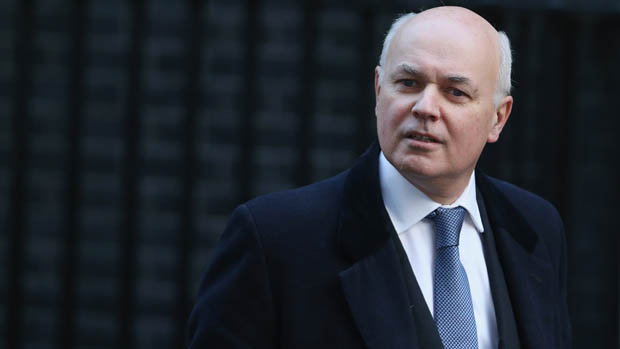What is the state pension triple lock and why does it matter?
Since 2010 the guarantee has caused the state pension to rise by a generous £1,100 a year

A free daily email with the biggest news stories of the day – and the best features from TheWeek.com
You are now subscribed
Your newsletter sign-up was successful
Any conversation or article about the state pension will mention the ‘triple lock’, but what is it and why is it becoming a political hot potato?
What is it?
The triple lock was introduced in 2006. It sets how much the state pension will rise by each year. The rise will either be the highest of three options: the growth in national average earnings, inflation as measured by the consumer price index, or 2.5 per cent.
The Week
Escape your echo chamber. Get the facts behind the news, plus analysis from multiple perspectives.

Sign up for The Week's Free Newsletters
From our morning news briefing to a weekly Good News Newsletter, get the best of The Week delivered directly to your inbox.
From our morning news briefing to a weekly Good News Newsletter, get the best of The Week delivered directly to your inbox.
It means that next April the state pension will rise by 2.5 per cent, or just under £4 a week. It also means pensioners have been seeing their state payouts upped by well ahead the rate of rock-bottom inflation in recent years while those for working-age households have been frozen.
What’s the problem?
A steadily rising state pension is a great election promise - there are more voters over 65 than any other age group because of their reliably high turnout rates - but in reality the triple lock is starting to cost too much. Since 2010 it has caused the state pension to rise by an incredibly generous £1,100.
A group of MPs are now calling for the triple lock to be scrapped because it is “unsustainable” and “unfair” on younger families, according to the Work and Pensions Committee.
A free daily email with the biggest news stories of the day – and the best features from TheWeek.com
Total pensioner spending, including the state pension and non-pension benefits such as winter fuel payments, is forecast to rise from around 6.1 per cent of GDP to 7.6 per cent over the next 20 years, according to the Financial Times. The triple lock is responsible for 0.4 per cent of that rise.
“If we go on uprating the state pension [by the triple lock] then by the mid-2040s it is a significant part of the affordability,” former CBI director general John Cridland, who is leading a wholesale review of the state pension, recently told a conference.
“In coming to a judgement about what is the best and right thing to do on the state pension age, we must address the generosity of the state pension and whether the triple lock was a policy for the short-term, the short-to-medium term, or the medium-to-long term.”
Who wants it scrapped?
It seems that most pension experts want the triple lock scrapped. Former Secretary of State for Work and Pensions, Iain Duncan Smith has said he feels the triple lock is too generous and told The Times he feels government spending on pensions has spiralled “out of control”.
Both ex-Work and Pensions Secretary Stephen Crabb and former pensions minister Ros Altmann also think it is time for the government to dump the triple lock.
“A wide range of politicians and economists now argue that the triple lock is redundant, with the 2.5 per cent element in particular being called into question,” says Tom McPhail, head of retirement at Hargreaves Lansdown, in the Daily Mail.
“Pensioners can’t continue to enjoy indefinitely a ‘heads I win, tails you lose’ guarantee at the expense of taxpayers.”
What could happen to it?
The triple lock is unlikely to disappear overnight. The Chancellor Philip Hammond confirmed in his Autumn Statement that the triple lock would stay throughout this parliament, which takes us to 2020. But there is growing pressure for it to be replaced after 2020.
Lady Altmann has called for the triple lock to be changed to a double lock with the 2.5% guarantee removed. That would mean the state pension rose by the higher of average earnings increases or inflation each year.
“A double lock would guarantee state pensions would not fall behind the cost of living or the rise in average earnings, and would protect pensioners relative to the rest of the economy and society,” says Altmann. “This would give pensioners better protection than other groups, which is right, but it would not ‘bake in’ the 2.5 per cent figure that is not related to any economic or societal yardstick.
But with the Labour party having just committed to renewing the pledge and all those votes at stake, you wouldn't want to bet against the triple lock being renewed.
-
 Local elections 2026: where are they and who is expected to win?
Local elections 2026: where are they and who is expected to win?The Explainer Labour is braced for heavy losses and U-turn on postponing some council elections hasn’t helped the party’s prospects
-
 6 of the world’s most accessible destinations
6 of the world’s most accessible destinationsThe Week Recommends Experience all of Berlin, Singapore and Sydney
-
 How the FCC’s ‘equal time’ rule works
How the FCC’s ‘equal time’ rule worksIn the Spotlight The law is at the heart of the Colbert-CBS conflict